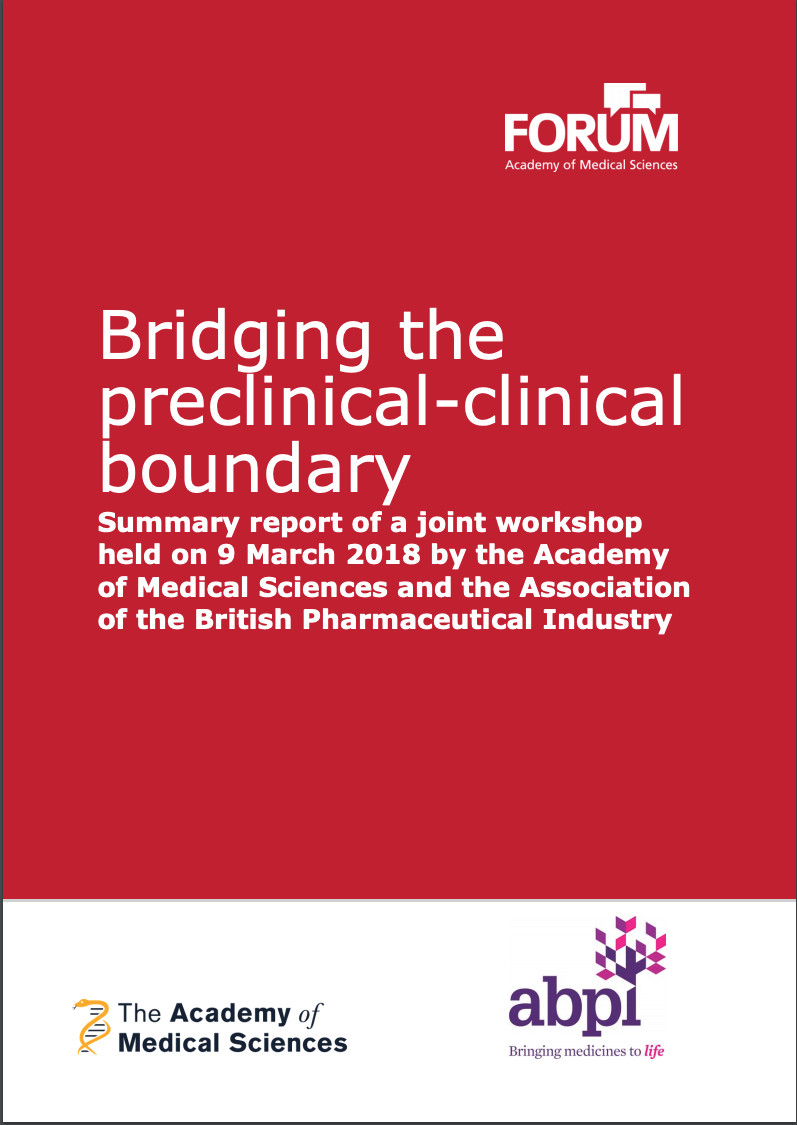The preclinical-clinical boundary is a key checkpoint in the translational pathway for research. It refers to the point at which preclinical evidence is considered sufficient to merit the move to first-in-human clinical studies, and represents a significant escalation in both resourcing and time, with a high risk of failure. Therefore there is a drive to ensure that the evidence base for progression into clinical studies is as robust and predictive as possible to maximise the chances of success and minimise risk of failure.
Status: Completed- You are here:
- Bridging the preclinical-clinical boundary
Bridging the preclinical-clinical boundary
The preclinical-clinical boundary is a key checkpoint in the translational pathway for research. It refers to the point at which preclinical evidence is considered sufficient to merit the move to first-in-human clinical studies, and represents a significant escalation in both resourcing and time, with a high risk of failure. Therefore there is a drive to ensure that the evidence base for progression into clinical studies is as robust and predictive as possible to maximise the chances of success and minimise risk of failure.
There are two key sources of evidence for maximising the chances of success of a therapy. The first comes from preclinical research, where therapeutic targets are selected and validated, and therapeutic interventions against those targets developed. Before proceeding into first-in-human studies, these therapies undergo a range of tests for predicting efficacy and safety, as well as understanding the expected metabolism and off-target effects in people. The second source of evidence is experimental medicine. Experimental medicine studies are studies in patients that aim to better inform preclinical research. This could be through testing and developing biomarkers and novel imaging techniques, better understanding pathology and immunology or trialling personalised medicine approaches in small groups of patients. Together these methods of research contribute to translational medicine, which aims to translate early discovery biology into better treatments for patients.
On 9 March 2018, the Academy of Medical Sciences and the Association of the British Pharmaceutical Industry held a workshop to examine how the UK can better bridge the preclinical-clinical boundary as part of this new model of translational research, and so remain at the forefront of discovering and developing new medicines. The meeting looked to identify challenges and remaining gaps, as well as where there is opportunity for greater integration of preclinical and clinical science, and the vision for the future of translational research in the UK.
Several key challenges were identified as impeding the better integration of the preclinical and clinical sciences:
- A need to move towards a ‘team science’ approach of interdisciplinary, cross sector working. Such an approach needs to define the ways that success is rewarded, especially in cross-sector teams, as well as allow the flexibility for researchers to experience working in different sectors, either through the opportunity of secondments or permanent positions – the Academy is leading in this area through its new cross-sector leadership scheme, FLIER. Open innovation and pre-competitive collaborations should also be widened to promote cross-sector working.
- Identifying emerging and future skills gaps and proactively addressing them through training schemes in areas such as statistics, clinical pharmacology, bioinformatics and pharmaceutical science. The clinical workforce should also be instilled with a research culture by embedding research skills into medical training and increasing awareness of the importance of research in the clinical workforce.
- Fostering the development of promising new preclinical and experimental medicine models that can de-risk discovery projects through both industry support and public funding for such research.
- Making the most of the UK’s existing research and clinical trial infrastructure by improving ‘sign-posting’ of expertise and supporting universities, SMEs and larger companies to access resources, collaborations, skills and infrastructure.
- The need for new models to be underpinned by a proportionate and flexible regulatory framework that encourages innovation in experimental medicine and helps to retain the UK’s status as a leading place to conduct clinical trials.
